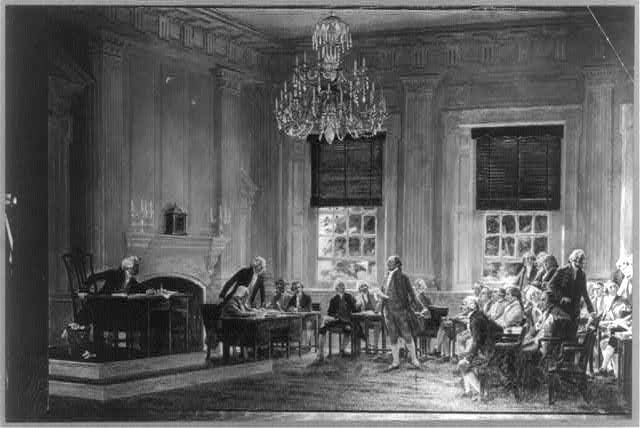John Adams
“Be not surprised,” twenty year old John Adams wrote a college friend on 12 October 1755, “that I am turned politician. This whole town is immersed in politics. The interests of nations and all the terrors of war make the subject of every conversation. I sit and hear.”
Adams found his calling while teaching school in Worcester, Massachusetts. Having earned his tuition, he left his teaching post and took up the study of law.
Adams confirmed his public-mindedness in a monograph published in 1765. In his Instructions of the Town of Braintree To Their Representative, Adams announced on behalf of his fellow townsmen that, “we have always understood it to be a grand and fundamental principle of the [English] constitution, that no freeman should be subject to any tax to which he has not given his own consent, in person or by proxy. And the maxims of the law, as we have constantly received them, are to the same effect, that no freeman can be separated from his property but by his own act or fault.”

Adam’s vigorous defense of his community against Parliament’s unprecedented tax policies of the mid and late-1760’s made him a prominent public figure in Massachusetts’ politically charged society. From an early point in his development as a “patriot” Adams endorsed a political system akin to one laid out by French social commentator Charles-Louis de Secondat, Baron de Montesquieu. The good it served vaguely resembled that described by Englishman John Locke. The politician from Braintree seems to have had difficulty, however, seeing society as something that exists apart from its government.

In his third “Clarendon” letter, which appeared in the Boston Gazette in the midst of the Stamp Act crisis, Adams wrote, “thus, it seems to appear, that two branches of popular power, voting for members of the house of commons, and trials by juries, the one in the legislative and the other in the executive part of the constitution, are as essential and fundamental to the great end of it, the preservation of the subject’s liberty, to preserve the balance and mixture of the government, and to prevent its running into an oligarchy or aristocracy, as the lords and commons are to prevent its becoming an absolute monarchy. These two popular powers, therefore, are the heart and lungs, the mainspring and the center wheel, and without them the body must die, the watch must run down, the government must become arbitrary, and this our law books have settled to be the death of the laws and constitution. In these two powers consist wholly the liberty and security of the people.”

Adams’ youthful admiration for England’s unwritten constitution and “the institutions that safeguard English liberty” faded as the political movement he spearheaded gained momentum. In the course of building the case for political independence, Adams reduced the people, who Hobbes and Locke had already reduced to a body politic, to something akin to a committee of the whole. In Adams’s rendering, there was no state of nature, nasty or idyllic and no trace of a social contract or an original commonwealth formed by individuals seeking a common good. Nor was there a weathering in of custom and tradition to establish the bonds and underlying order necessary for civil society to form and perpetuate.
In Adam’s view, the people expressed their agency not in their customs and traditions which followed their style of living, but in the management of their government. However government formed, whatever the customs of its underlying society, it should be checked, Adams seems to say, by popular elections and trial by jury to prevent it from becoming oppressive.
Rousseau had theorized about replacing [his] oppressive society with one more perfect, i.e., more equal. Adams put a theoretical engine in gear by creating a organization, which in a relatively short time undermined English authority and destroyed its ability to govern its American colonies. He went on to lay a foundations for a new republican society in America. An aspiring chairman of the committee of the entirety, Adams saw no irony in decrying the danger of “arbitrary” government as he
established an equally arbitrary power to promote political rebellion.
Fearing no evil from politics, Adams went on to define the common good
in singularly political terms: “We ought to consider what is the end of government before we determine which is the best form. Upon this point
all speculative politicians will agree, that the happiness of society is the end of government, as all divines and moral philosophers will agree that the happiness of the individual is the end of man. From this principle will follow, that the form of government which communicates ease, comfort, security, or, in one word, happiness, to the greatest number of
persons, and in the greatest degree, is best.”
A leading advocate for the American “cause”, Adams found moral justification in the idea that government by consent of the people would produce “happiness”. This being the end of man and society by acclamation, there was no need to look further into the idea of the common good. The matter being settled, the lawyer patriot decided that his countrymen should abandon their place in the English commonwealth and risk everything to vindicate his political opinion that “our provincial legislatures are the only supreme authorities in our colonies.”





